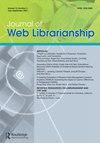Leung, S. Y., & López-McKnight, J. R. (Eds.). (2021). Knowledge Justice: Disrupting Library and Information Studies through Critical Race Theory
IF 3
Q3 INFORMATION SCIENCE & LIBRARY SCIENCE
引用次数: 0
Abstract
matters. Chapter 2 focuses on how privacy is regulated in the UK through legislation, contracts, standards, ethical and professional values, and case law. Chapter 3 has 20 practical examples of privacy issues that arise in a library context, from the use of CCTV to online databases to books on prescription (bibliotherapy books related to the treatment of mental and psychological disorders), among others. Chapter 4 gives six case studies for the reader to contemplate, from a single digital presence for public libraries in England to the introduction of national entitlement cards in Scotland. Chapter 5 deals with cybersecurity issues, especially bring your own device (BYOD) challenges. Chapter 6 considers the topic of personal data breaches, with nine examples to consider. Chapter 7 is a short chapter on access to and sharing of user data, with the London Bridge terrorist incident and the murder of MP Jo Cox provided as examples. Chapter 8 discusses various privacy policy statements on topics such as RFID and payment cards. Chapter 9 looks at privacy audits and data protection, while Chapter 10 examines data protection impact assessments. Chapter 11 moves on to vendors and privacy issues, and Chapter 12 has 26 practical steps to protect users’ privacy. After a short discussion on the right of oblivion and the right to be forgotten, the Conclusion deals with intellectual privacy and where libraries fit into the defense of privacy. An extensive bibliography of further readings, toolkits and other resources, along with a glossary of terms, is provided. Given the caveats related to the specific focus on UK privacy laws and the author’s disclaimer, this book contains quite a bit of useful information. There are numerous figures and tables throughout, and the specific case studies from British libraries are detailed yet approachable.梁S.Y.和洛佩斯·麦克奈特J.R.(编辑)。(2021)。知识正义:批判种族理论对图书情报研究的颠覆
很重要。第2章侧重于英国如何通过立法、合同、标准、道德和专业价值观以及判例法对隐私进行监管。第3章有20个在图书馆环境中出现的隐私问题的实际例子,从CCTV的使用到在线数据库,再到处方书籍(与精神和心理障碍治疗有关的阅读疗法书籍)等等。第四章给出了六个案例研究供读者思考,从英格兰公共图书馆的单一数字存在到苏格兰国家权利卡的引入。第5章处理网络安全问题,特别是自带设备(BYOD)的挑战。第6章探讨个人资料外泄的主题,并举出九个例子供参考。第七章是关于访问和共享用户数据的简短章节,以伦敦桥恐怖事件和议员乔·考克斯被谋杀为例。第8章讨论了有关RFID和支付卡等主题的各种隐私政策声明。第9章研究隐私审计和数据保护,而第10章研究数据保护影响评估。第11章继续讨论供应商和隐私问题,第12章有26个保护用户隐私的实际步骤。在对遗忘权和被遗忘权进行了简短的讨论之后,结语部分讨论了知识隐私以及图书馆在保护隐私方面的作用。提供了进一步阅读、工具包和其他资源的广泛参考书目,以及术语表。考虑到与英国隐私法和作者免责声明的具体重点相关的警告,本书包含相当多的有用信息。全书中有大量的图表和表格,来自英国图书馆的具体案例研究详细而平易近人。
本文章由计算机程序翻译,如有差异,请以英文原文为准。
求助全文
约1分钟内获得全文
求助全文
来源期刊

Journal of Web Librarianship
INFORMATION SCIENCE & LIBRARY SCIENCE-
CiteScore
2.50
自引率
13.30%
发文量
17
 求助内容:
求助内容: 应助结果提醒方式:
应助结果提醒方式:


